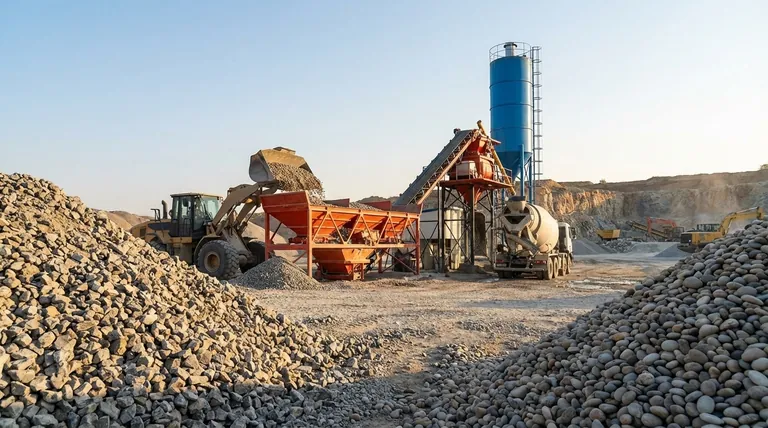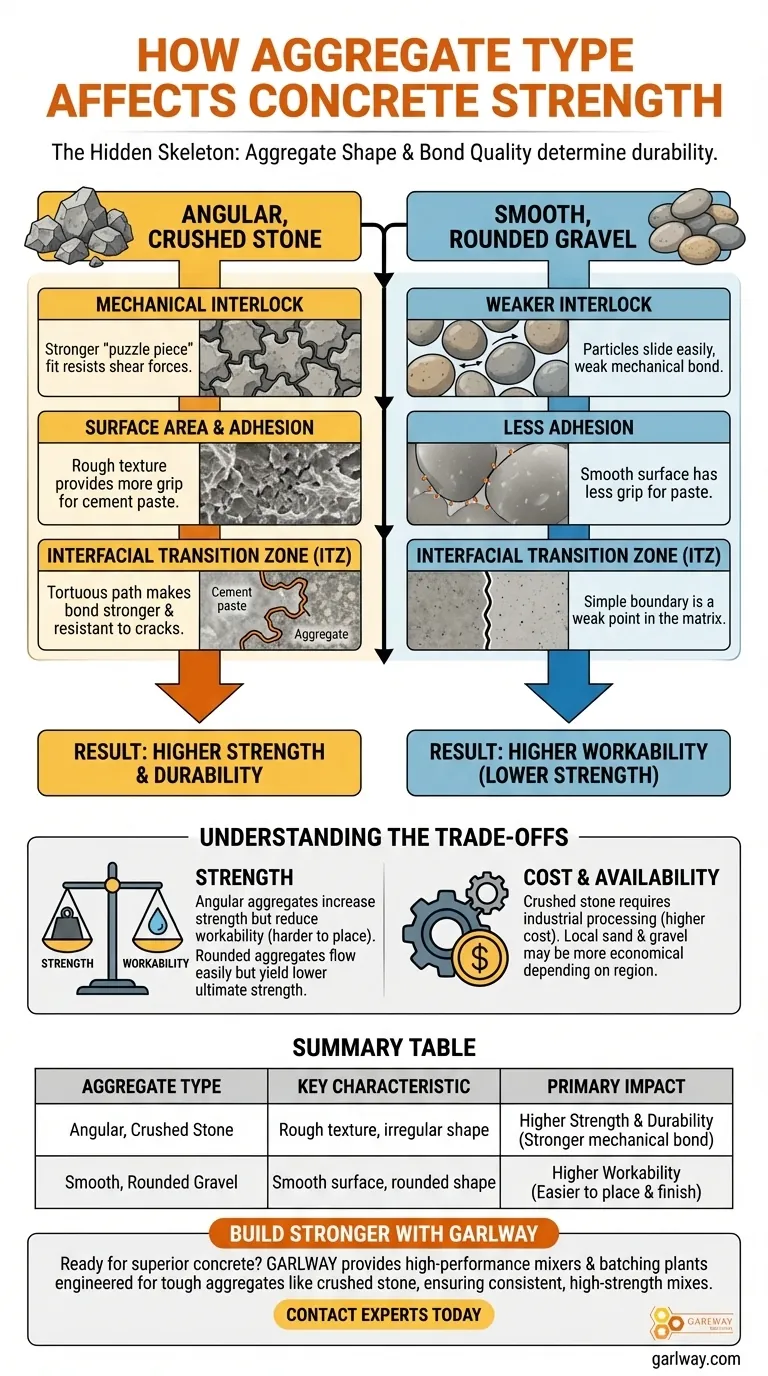The type of aggregate is a primary factor in determining the final strength of concrete. For a given water-cement ratio, concrete made with rough, angular crushed stone will be significantly stronger than concrete made with smooth, rounded pebbles or gravel. This is because the irregular shape of crushed stone provides a superior mechanical bond with the surrounding cement paste.
The strength of concrete is not just about the quality of the cement paste; it's fundamentally about the quality of the bond between that paste and the aggregate. Angular, textured aggregates create a stronger mechanical lock, resulting in a more robust and durable final product.

The Role of Aggregate in Concrete's Structure
Aggregate is often viewed as a simple filler to reduce costs, but it is the structural skeleton of the concrete. Its physical characteristics dictate how forces are distributed throughout the material when it is under load.
Mechanical Interlock: The Key to Strength
The shape of an aggregate particle is critical. Angular, crushed stone has sharp edges and irregular faces.
When mixed into the concrete, these irregular shapes fit together like puzzle pieces, creating a strong, interlocked frame. This physical connection helps resist shear forces and prevents the aggregate from slipping within the cement paste under pressure.
Surface Area and Adhesion
Crushed stone possesses a rougher texture and a larger surface area compared to smooth, rounded river gravel.
This increased surface area provides more "grip" for the cement paste to adhere to. A stronger bond between the aggregate and the paste means that any cracks have a more difficult path to travel, increasing the concrete's overall toughness and compressive strength.
The Interfacial Transition Zone (ITZ)
The microscopic layer where the cement paste meets the surface of the aggregate is called the Interfacial Transition Zone (ITZ). This zone is often the weakest point in the concrete matrix.
With smooth, rounded aggregate, the ITZ is a simple, weak boundary. With rough, crushed aggregate, the ITZ becomes a complex, tortuous path. This complexity makes the bond much stronger and more resistant to failure.
Understanding the Trade-offs
While crushed stone provides superior strength, the choice of aggregate is not always straightforward. Practical considerations often require a balanced approach.
Strength vs. Workability
The very angularity that gives crushed stone its strength also makes the concrete mix harsher and less workable. It can be more difficult to pump, place, and finish.
Conversely, the smooth, rounded shape of pebbles allows the particles to slide past each other easily. This results in a mix with excellent workability, which is easier to handle and requires less effort to consolidate into forms.
Cost and Availability
The most practical choice for an aggregate is often dictated by local geology, availability, and cost.
Crushing stone is an industrial process that adds cost, whereas naturally occurring sand and gravel may be more economical in certain regions. The project specifications must be weighed against the local material supply chain.
Making the Right Choice for Your Goal
Selecting the appropriate aggregate requires you to define the most critical priority for your specific application.
- If your primary focus is maximum strength and durability: Use a well-graded, angular crushed stone for superior mechanical interlock and bond.
- If your primary focus is high workability and ease of placement: Consider using rounded aggregate, but be prepared to accept a lower ultimate strength for the same mix design.
- If your primary focus is a cost-effective, general-purpose mix: The optimal choice is often a blend of locally sourced materials that meets the project's minimum specified strength requirements.
Ultimately, understanding the link between aggregate shape and mechanical bonding empowers you to specify a concrete mix that perfectly balances strength, workability, and cost.
Summary Table:
| Aggregate Type | Key Characteristic | Primary Impact on Concrete |
|---|---|---|
| Angular, Crushed Stone | Rough texture, irregular shape | Higher Strength & Durability (Stronger mechanical bond) |
| Smooth, Rounded Gravel | Smooth surface, rounded shape | Higher Workability (Easier to place and finish) |
Ready to build with stronger, more durable concrete?
At GARLWAY, we specialize in providing construction companies and contractors with the high-performance machinery needed for superior concrete production. Our concrete mixers and batching plants are engineered to handle tough aggregates like crushed stone, ensuring a consistent, high-strength mix for every project.
Let us help you achieve optimal results. Contact our experts today to discuss your specific needs and find the perfect equipment solution.
Visual Guide

Related Products
- HZS35 Small Cement Concrete Mixing Batch Plant
- HZS180 Ready Mix Concrete Plant for Foundations with Sand and Cement
- HZS75 Concrete Batching Plant Cement Mixer Price Concrete Mixer Bunnings Mixing Plant
- HZS120 Ready Mix Concrete Batching Plant Commercial Mud Cement Mixer
- JW1000 Mobile Cement Mixer Concrete Mixer Truck and Batching Plant
People Also Ask
- What is a winch and how does it function? A Guide to Powerful Pulling Solutions
- How do winch machines improve safety in heavy lifting operations? Ensure Controlled, Accident-Free Lifting
- What is the impact of urbanization on the development of ready-mixed concrete? Essential for Modern City-Building
- What are the durability benefits of hydraulic winches? Superior Performance for Heavy-Duty Tasks
- What is the role of the solenoid valve block in a hydraulic winch? The Electro-Hydraulic Brain for Control
- How can you determine if the cement mixture has the right consistency? Achieve optimal strength and workability.
- How can one determine the correct winch size for their vehicle? Calculate the Safe & Effective Capacity
- What should be done before starting the hoist? A 3-Step Safety Protocol to Prevent Accidents


















